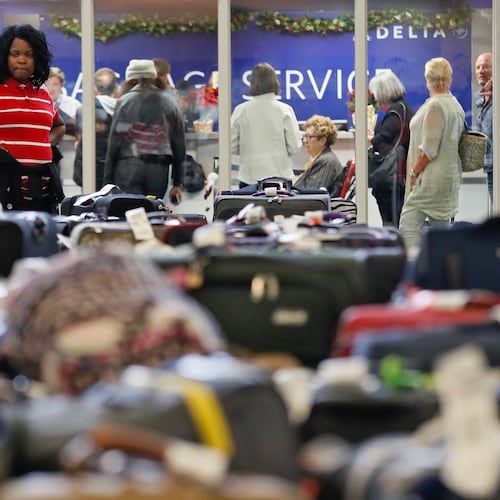President Donald Trump on Monday extended the pause on his “Liberation Day” tariffs to Aug. 1, but signaled he is ramping up pressure on countries to strike deals or face new rounds of tariffs.
Trump announced 25% import taxes will take effect next month on products originating in South Korea and Japan, two key trade partners for Georgia and the nation.
As of late Monday afternoon, Trump posted copies of letters sent to leaders of at least 14 countries, and additional countries are expected to receive similar notices. But of the list, South Korea and Japan have the biggest trade ties to Georgia.
Three months ago, Trump put on hold most of the “reciprocal” tariffs he announced April 2, which he coined “Liberation Day,” amid panic in the stock and bond markets.
On Monday, White House press secretary Karoline Leavitt said Trump would sign an order extending the negotiating deadline on the reciprocal tariffs to Aug. 1. But the announcement of the new levies is likely intended to bring trade partners back to the negotiating table.
In letters sent to the leaders of Japan and South Korea, Trump said the 25% tariffs would go into effect Aug. 1 if talks extend beyond that deadline and could be adjusted up or down depending upon how each country responds.
“Please understand that the 25% number is far less than what is needed to eliminate the Trade Deficit disparity we have with your Country,” said the letters, which Trump posted on his Truth Social account.
Stocks slumped Monday as investors grappled with another round of trade tension.
“The turmoil restarts,” according to Sina Golara, assistant professor of supply chain management at Georgia State University’s Robinson College of Business. He said in written comments that Trump “is signaling that he is serious about implementing tariffs, however extreme they may seem, while also showing a willingness to strike deals.”
“At the same time, he is renewing his threat that any retaliation will trigger counter-retaliation, potentially setting off a chain reaction, as seen previously with China,” he added.
In Trump’s first few months back in the White House, he rattled global markets by slapping tariffs on imported metals, including steel and aluminum, foreign automobiles and parts, and blanket tariffs on many of the nation’s top trade partners. Some of those were later put on hold or reduced after markets melted down and economists warned of the potential for the levies to bring about a recession.
With markets largely recovered from sell-offs sparked by those fears, Trump appears to be once again ratcheting up pressure in hopes of reaching deals.
“We have details on 14 countries, and it’s weirder than I imagined,” Justin Wolfers, a University of Michigan economist, posted on X, formerly Twitter, late Monday afternoon. “The new tariffs are the old ‘Liberation Day’ numbers (plus or minus) a few percentage points. If these were a bad idea 90 days ago, why are they a good idea now?”
Trump’s renewed trade demands could escalate into a “cascading trade war,” according to Golara, “especially with countries that may find it politically or economically unacceptable not to respond.”
Korea and Japan could face the hit of both reciprocal tariffs and tariffs that have already targeted the auto industry, he noted.
South Korean and Japanese brands are some of the most popular in the U.S., and though automakers from both countries have factories in North America, many of the parts originate in Asia and some models are only made in Asia.
The tariffs could “severely disrupt trade flows, affecting up to a quarter of a trillion dollars’ worth of goods” — with the auto industry likely to be the hardest hit, followed by electronics, Golara said.
If imports of cars from Japan and Korea are disrupted, consumers could see shortages and price hikes, according to Golara.
Nations and companies have tried to win Trump’s favor. In late March, days before Trump’s announcement of reciprocal tariffs and the enactment of the auto tariffs, Hyundai Motor Group announced plans at the White House to invest $21 billion in its U.S. vehicle supply chain, production and electric vehicle charging. The announcement included a new steel factory in Louisiana to supply its Georgia and Alabama automotive plants.
Trump said in his letters, which were largely the same to South Korea and Japan, that there would be no tariffs instituted on goods made by foreign companies at facilities in the U.S. Trump also wrote that if either country were to institute new tariffs in retaliation, the U.S. would add that amount to the 25%.
South Korea and Japan are top 10 trade partners for the state of Georgia. Both are also prolific investors in facilities in the Peach State.
Korea has been one of the top nations for foreign direct investment into Georgia for the past several years, buoyed by the $7.6 billion Hyundai electric vehicle and battery plant near Savannah, and other South Korean battery factories in Bartow and Jackson counties.
Korea was also the third-largest source of imported goods into Georgia, totaling $16.6 billion in 2024, according to the Georgia Department of Economic Development.
Japan ranked sixth at more than $6.6 billion last year, the Department of Economic Development said.
The 25% rates quoted in his letters to South Korea and Japan are nearly the same as the rates Trump proposed on the countries in April.
Tariffs are taxes on imported goods, and economists consider them inflationary. Those taxes typically are passed along by businesses to the buyers of products, whether the buyers are manufacturers obtaining parts that go into other things or a consumer shopping at a store or online.
Thus far, for the tariffs that have been enacted, many U.S. companies appear to be largely absorbing the costs, at least for now.
In recent days, Trump also announced a deal with Vietnam that would set 20% tariffs on goods from the Asian country, the fifth-largest source of imports to Georgia.
Keep Reading
The Latest
Featured




